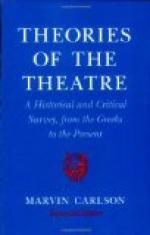In elucidation of what might otherwise seem perversity on the part of great dramatic authors like Shakespeare, we must remember that the master-dramatists have nearly always been men of the theatre rather than men of letters, and therefore naturally more avid of immediate success with a contemporary audience than of posthumous success with a posterity of readers. Shakespeare and Moliere were actors and theatre-managers, and devised their plays primarily for the patrons of the Globe and the Palais Royal. Ibsen, who is often taken as a type of the literary dramatist, derived his early training mainly from the profession of the theatre and hardly at all from the profession of letters. For half a dozen years, during the formative period of his twenties, he acted as producing manager of the National Theatre in Bergen, and learned the tricks of his trade from studying the masterpieces of contemporary drama, mainly of the French school. In his own work, he began, in such pieces as Lady Inger of Ostrat, by imitating and applying the formulas of Scribe and the earlier Sardou; and it was only after many years that he marched forward to a technique entirely his own. Both Sir Arthur Wing Pinero and Mr. Stephen Phillips began their theatrical career as actors. On the other hand, men of letters who have written works primarily to be read have almost never succeeded as dramatists. In England, during the nineteenth century, the following great poets all tried their hands at plays—Scott, Southey, Wordsworth, Coleridge, Byron, Shelley, Keats, Browning, Mrs. Browning, Matthew Arnold, Swinburne, and Tennyson—and not one of them produced a work of any considerable value from the standpoint of dramatic criticism. Tennyson, in Becket, came nearer to the mark than any of the others; and it is noteworthy that, in this work, he had the advantage of the advice and, in a sense, collaboration of Sir Henry Irving.
The familiar phrase “closet-drama” is a contradiction of terms. The species of literary composition in dialogue that is ordinarily so designated occupies a thoroughly legitimate position in the realm of literature, but no position whatsoever in the realm of dramaturgy. Atalanta in Calydon is a great poem; but from the standpoint of the theory of the theatre, it cannot be considered as a play. Like the lyric poems of the same author, it was written to be read; and it was not devised to be presented by actors on a stage before an audience.




